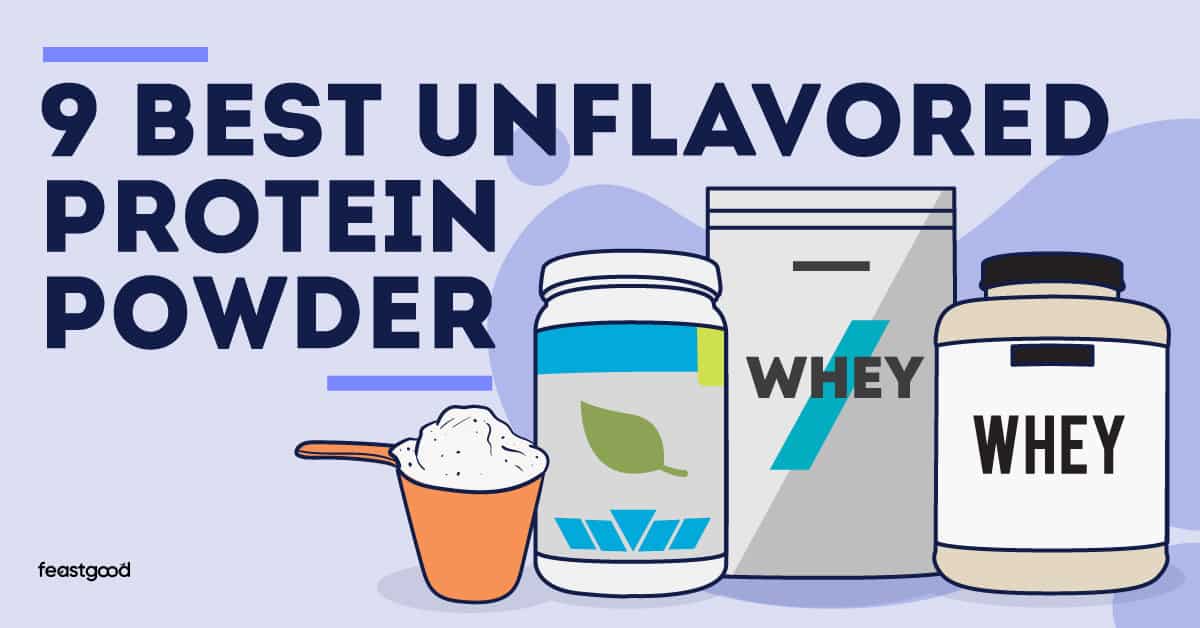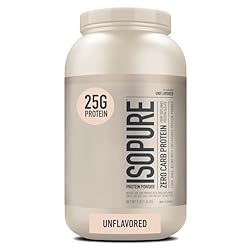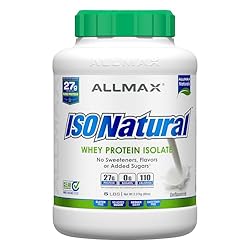Some links in this article are affiliate links, which means we earn from qualifying purchases. Learn more.
When it comes to choosing a protein powder, one of the biggest factors taken into consideration is typically taste.
But what happens when we remove the taste from the equation completely to try to find the best-unflavored protein powders?
In my combined experience as a personal trainer, nutrition coach, and supplement store manager for more than ten years, I can tell you what differentiates high-quality protein powders from lesser-quality ones.
In A Hurry? Here’s My Top Recommendation
- Naked Whey is the top overall unflavored protein powder. Naked Whey provides the best balance of satiety, protein percentage, and price.
- They are also third-party tested to ensure ingredient purity and accuracy.
- Other benefits include using grass-fed whey and having zero added ingredients.
Summary: Our Top 3 Picks

Best Overall
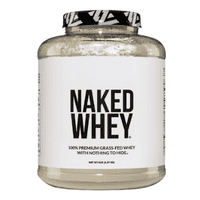
Naked
Whey
Type of Protein:
Grass-Fed Whey Concentrate
5.0 /5
Effective Ingredients
5.0 /5
Nutrition Label Transparency
4.0 /5
Protein Percent of Calories
3.0 /5
Mixability
3.0 /5
Satiety

Best Post-Workout
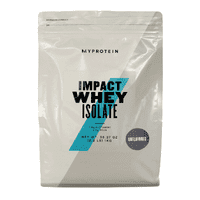
MyProtein Impact Whey Isolate
Type of Protein:
Whey Isolate
4.0 /5
Effective Ingredients
4.0 /5
Nutrition Label Transparency
4.5 /5
Protein Percent of Calories
5.0 /5
Mixability
1.0 /5
Satiety

Best Vegan
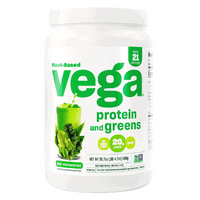
Vega Protein & Greens
Type of Protein:
Pea and Brown Rice
4.0 /5
Effective Ingredients
5.0 /5
Nutrition Label Transparency
3.0 /5
Protein Percent of Calories
2.0 /5
Mixability
4.0 /5
Satiety
Medical Disclaimer: The material presented in this article aims to offer informational insights. It should not be perceived as medical guidance. The views and writings are not designed for diagnosing, preventing, or treating health issues. Always consult with your physician prior to starting any new dietary or supplement routine.

Best Unflavored Protein Powders
- Best overall: Naked Whey
- Best post-workout: MyProtein
- Best vegan: Vega Protein + Greens
- Best for baking: Quest Multi Purpose Protein Powder
- Best slow release: MyProtein Casein
- Best value: Bulk Supplements Isolate ($1.27 per serving for an isolate, as low as $1.19 if you buy the 5kg size)
- Best gainer: Naked Mass
- Best Beef Protein: Bulk Supplements Beef Isolate
- Best meal replacement: Progressive VegEssential All-In-One
1. Best Overall: Naked Whey
Overall rating: 4/5
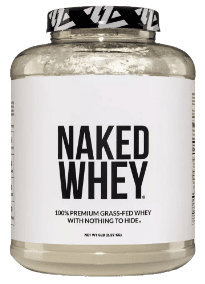
Our Thoughts
Our favorite thing about Naked Whey is that the unflavored protein genuinely contains just one ingredient: Whey Concentrate.
Whey concentrates typically offer more satiety than isolate proteins, but do have a few additional grams of carbs and fats remaining from the milk. The typical trade-off here is that it is slightly higher calorie with a lower protein percentage, but is less expensive.
Naked Whey does not contain any additional ingredients in the form of emulsifiers, preservatives, or fillers. It is also third party tested and Informed Choice Certified, making it a suitable product for any elite and/or drug-tested athletes.
This is the perfect protein powder for anybody looking to avoid every possible additive or artificial ingredient. It’s a bit on the expensive side, but is third quality tested and comes from grass-fed whey, ensuring that it is free of growth hormone and antibiotics.
It costs between $1.25 and $1.60 per serving and offers 83% protein per scoop, making it a good value for a good source of protein.
- Check out my full review of Naked Whey Protein
Highlights
- Contains one single ingredient: Whey concentrate
- Is third party tested and publicly shows the results of its heavy metal and gluten testing
- Non GMO and contains no soy or gluten
- A good any time of day protein
Drawbacks
- Doesn’t mix as easily as isolate proteins, and can tend to mix up a little bit foamy
2. Best Post-Workout: MyProtein Impact Whey Isolate
Overall rating: 4/5
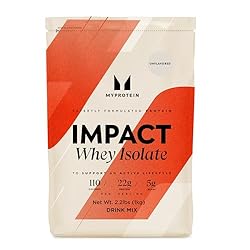
Our Thoughts
MyProtein Impact Whey Isolate uses exclusively the fast digesting isolate protein, but also contains sunflower and soya lecithin as emulsifiers (as opposed to Naked Whey above which does not use any emulsifiers).
To note: On the US website, the ingredients for unflavored Impact Whey Isolate are simply: Whey Protein Isolate. On the UK website however, they also list soya and sunflower lecithin as emulsifiers.
My personal bag at home (which is mocha flavored) lists sunflower lecithin on the ingredient label, but this ingredient isn’t listed on the US website either.
I am not sure if this is a discrepancy in the actual ingredients used, or the labeling standards between countries. Ultimately, I think it’s most likely that this product does contain soy or sunflower lecithin as an emulsifier, despite the US website not listing it.
Even so, the unflavored protein powder contains 22g of protein per 90 calorie serving, offering up a fantastic 97.7% protein per scoop. (Our criteria for a “great” protein source is anything above 85%, so this product far exceeds that).
Being purely a whey isolate, this product mixes easily and quite thin, and won’t provide much satiety. It is, however, a great post-workout option or suitable for anybody who is looking to add more protein to their diet without spoiling their appetite.
If you are looking for products that offer more satiety, consider Quest Nutrition or MyProtein casein instead.
- Check out my full review of MyProtein Whey Isolate
Highlights
- Fast digesting, low sugar and low fat
- Great for post-workout
- Very high protein percentage per scoop
- Mixes up easily
Drawbacks
- Can be more costly than other protein types
- Will not provide satiety
3. Best Vegan: Vega Protein & Greens
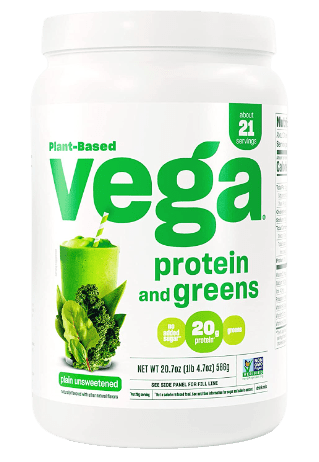
Overall rating: 3.5/5
Our Thoughts
Vega Protein and Greens offers 20g of plant-based protein per scoop as well as a greens blend for added nutrients. They use a blend of pea and brown rice protein, with the addition of spinach, kale powder, alfalfa grass, sacha inchi, and broccoli powders.
The blend is low-carb and keto-friendly, non-GMO, dairy-free, and gluten-free making it a great option for anyone with food sensitivities.
At nearly 73% protein per scoop, this falls within a good protein percentage for plant-based proteins (which typically contain lower percentages of protein per serving than animal-based proteins).
This product will definitely still have a taste, despite being unflavored. The combination of plant protein and vegetable powders will give this powder an earthy taste and it will maintain a relatively gritty texture when mixed with just water or milk/milk substitute.
This is a good option for somebody who wants to make a nutrient-rich smoothie in the morning, without having to take the extra steps of adding vegetables.
This one is a bit more costly per serving, at around $1.83 per scoop, but the added nutrients do off-set the cost a little bit.
Highlights
- Vegan formula
- Dairy Free, Gluten-Free, Soy-Free
- High nutrient content (extra calcium, iron, as well as vitamins A, C, and K)
Drawbacks
- Undesirable taste and gritty texture
- More expensive than traditional whey protein powders
4. Best for Baking: Quest
Overall rating: 3.5/5
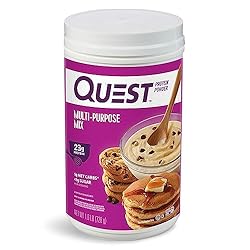
Our Thoughts
Quest Multi-Purpose Protein Powder is a blend of whey isolate (fast digesting) and micellar casein (slow digesting) protein. They have also added sunflower, canola and/or soy lecithin, xanthan and cellulose gum, and silicon dioxide.
It has 100 calories per scoop with 23 grams of protein, therefore providing 92% protein per scoop (making it a great source of protein).
The blend of isolate and casein means that the product will mix relatively easily, but will provide more prolonged satiety.
From personal experience, a blend of whey and casein has provided the best baking results and Matt Rosenman, blogger and personal trainer with a degree in Health Behavioural Sciences details a similar experience:
“In my experience, [a whey and casein blend is] the best protein powder to use for cakes. The whey protein helps to provide structure, and the casein retains moisture. However, it still bakes dry, so be sure to bake for less time in the oven to prevent your recipe from drying out.”
While we typically look for products with as few additional ingredients as possible, the addition of silicon dioxide in this formula helps to avoid clumping and caking, which further adds to why this protein is a great one to add to recipes.
Between the Quest website and Amazon.com, I found this product listed for between $1.26 and $1.46 per serving, and both websites offer subscribe and save features to bring the cost down even lower.
Highlights
- Great for baking
- Will mix up thicker than whey isolates and whey concentrates
- Added ingredients to help prevent clumping
- Gluten-free, low-sugar, and low fat
Drawbacks
- Only available in a small (1.6lb/26 serving) size
- Contains more potential allergens due to the addition of soy lecithin and vegetable oil which includes soybean
5. Best Slow Release: MyProtein Casein
Overall rating: 4/5
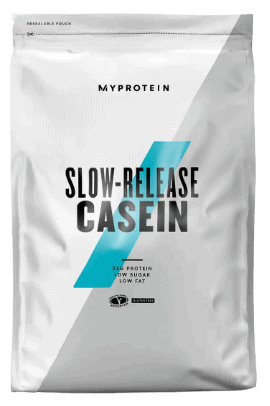
Our Thoughts
It was really difficult to find a casein product that used exclusively casein and was unflavored. Thankfully, the company that does supply one is a company we’ve extensively tested and feel confident recommending.
Casein protein is slow-absorbing, and is a good option to provide prolonged satiety between meals or overnight.
I checked the UK, US, and Canadian MyProtein website, the Unflavored Ingredients list shows that this product only contains 100% micellar casein protein and nothing else. (I wanted to triple check, just because of the discrepancies in lecithin ingredients in the isolate that I outlined above).
For anyone who is looking for a slow digesting protein with zero fillers, additives, or preservatives, this is a fantastic option!
It will mix up quite thick, especially when compared to a whey isolate and will leave you feeling noticeably more full.
MyProtein Casein has 23g of protein per scoop and 110 calories, delivering 84% protein per scoop, which is great for a casein protein. Other popular flavored casein proteins on the market provide 74-80% protein per scoop
Highlights
- Slow digesting, therefore good for promoting satiety
- No fillers, gums, or additives
- Gluten Free
- Third party tested
Drawbacks
- More difficult to mix, and requires more work for it to dissolve completely
- Unflavored option is only available in a 5.5lb bag, retailing for $114.99.
6. Best Value: Bulksupplements.com
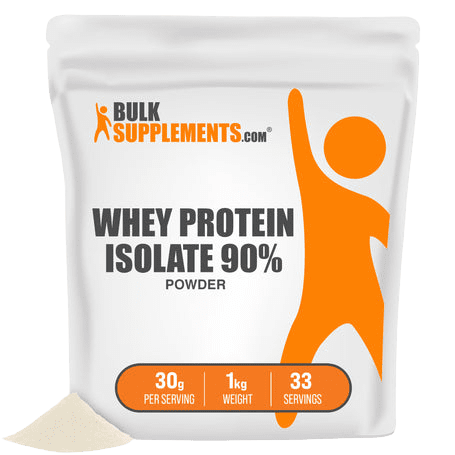
Overall rating: 4.5/5
Our Thoughts
The best cost per serving that we have found on whey protein comes from BulkSupplements.com whey protein concentrate.
It has 23g of protein per 120 calorie serving, providing around 77% protein per scoop. Similar to Naked Whey, the only ingredient listed is whey protein concentrate.
Unlike Naked Whey, however, this product is available for less than $1.00 per serving. Current pricing on bulksupplements.com has this product for between $0.92 and $0.97 per scoop if you invest in 33 servings or more.
We’ve ranked Naked Whey as our #1 choice over BulkSupplements, because it provides the higher overall protein percentage per scoop (83% vs 76.6%), and has a lower percentage of carbohydrates and fats.
If you find yourself on a strict budget, and you still want a protein powder that is third party tested with no gums, fillers, or preservatives, then bulksupplements.com is a great choice.
BulkSupplements.com stays away from flashy branding and extravagant packaging, which helps them keep a lower cost per serving.
A potential drawback is that they ship their protein powders in resealable bags, which puts them at increased risk for puncture or spillage if you try to carry it around with you. The products also don’t contain a scoop, so you will need to have tablespoons on hand to measure your product out.
- Check out my full review of Bulk Supplements Protein
Highlights
- Best cost per serving for a whey concentrate, under $1.00 per serving
- Third party tested
- Zero added ingredients, resulting in a product that is gluten-free and soy-free
Drawbacks
- Ships in a plastic bag as opposed to a tub, increasing the risk for spillage or puncture
- Has a lower protein percentage per scoop than other whey concentrates
7. Best Gainer: Naked Mass
Overall rating: 3.5/5
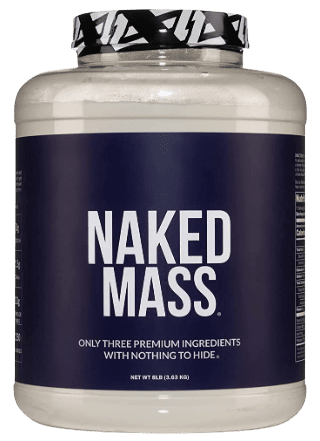
Our Thoughts
In similar fashion to casein proteins, it’s very difficult to find a mass gaining product that is unflavored.
We’ve reviewed Naked Mass thoroughly, and our main complaint was that the vanilla and chocolate flavors were really high in added sugar and didn’t taste good, so we recommended going for the unflavored version if you did want the quality associated with this product.
Not only does Naked Mass not have added sugar or flavoring, but it contains only 3 total ingredients: Organic Tapioca Maltodextrin, Whey Protein Concentrate, and Micellar Casein.
With 1250 calories per 4 scoop serving, this product is a good one for individuals who are trying to gain weight, but are struggling to eat enough calories throughout the day to support that goal.
Being high in carbohydrates, this is also a good option to consider for post-workout recovery after very intense exercise to support muscle recovery.
This is not the product for someone looking for just a protein powder. It retails for $69.99 for an 8lb tub which sounds great, but if you take the full serving it yields only 11 servings or $6.36 per serving.
Even if you cut the servings in half to provide 25g of protein, similar to other protein powders, the cost is around $3.18 per serving, well above other protein powders.
- Check out my full review of Naked Mass Gainer
Highlights
- High-calorie, suitable for individuals who are struggling to gain or maintain their weight
- Contains only three high-quality ingredients
- Third-party tested to ensure quality and purity
- Whey protein from grass-fed cows who spend large amounts of time free-roaming
Drawbacks
- Expensive by most standards: when compared to protein powders and when compared to other weight-gaining products
- Only available in an 11-serving container
- Has a slightly gritty texture when mixed with water
8. Best Beef Protein: Bulk Supplements Beef Isolate
Overall rating: 4/5
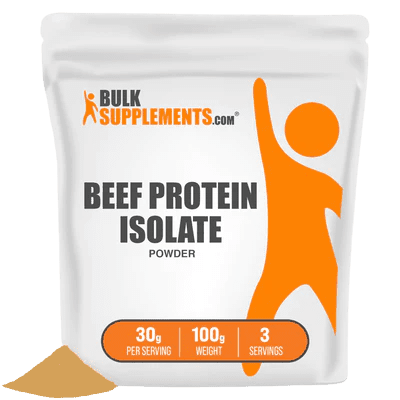
Our Thoughts
This may or may not be a category of protein that is familiar to you. Beef Protein isolates are a great option for people who have dairy allergies, but don’t want the grittiness or “earthy” taste of vegan protein powders.
There are very few companies that currently manufacture beef protein powders, and even fewer of them make unflavored options.
BulkSupplements.com came in clutch here, offering a beef protein isolate at a reasonable cost. There are only 35 reviews on the BulkSupplements web page currently, but it’s sitting at a 4.7/5 star rating with zero 1 or 2-star reviews.
Amazon.com currently has the beef isolate listed at $34.96 for a 1kg (33 serving) bag, making it only $1.05 per serving for 25g of protein.
With 25g of protein and 110 calories per serving, this beef protein isolate comes in around 91% protein per scoop, making this a great source of protein made even better by the inexpensive price tag.
BulkSupplements.com ingredients are third-party tested, and this product contains no ingredients aside from the beef protein isolate, resulting in a product that has no soy, gluten, or lactose, and is free from added sugar and preservatives.
Similar to the Bulk Supplements whey protein, this product does not contain a scoop and will be shipped in a Ziploc-style bag, so there may be extra steps involved in transferring it to a more stable container and you will need measuring spoons to measure out the 30g.
Highlights
- Very high protein percentage per scoop (91%)
- Dairy-free, gluten-free, soy-free
- Great value
Drawbacks
- May not dissolve as completely as a whey protein
- Limited stock available
9. Best Meal Replacement: Progressive VegEssential All-In-One
Overall rating: 3.9/5
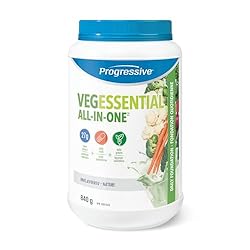
Our Thoughts
In the interest of being complete in this review, and trying to find an unflavored option for every use case, I scoured the internet to find a meal replacement powder that was comprehensive, nutritious, high quality, AND unflavored.
There wasn’t a lot, certainly not in unflavored options. There is however one product I came across that I was elated to find out came unflavored.
Progressive VegEssential All-In-One is a blend of vegan protein powder, greens, a multivitamin, fiber, and omega-3 making it one of the most complete all-in-one products on the market.
While the vegan protein powder and added greens make this product a bit more gritty and definitely “earthy” tasting, it is filled with so many nutrients and high-quality ingredients that I think the health benefits far outweigh the potentially off-putting taste.
VegEssential All-In-One has 180 calories per serving, 27g of protein, 8g of carbs with 7g of fiber, and 5g of fat.
It contains soy and wheat, and is therefore not suitable for individuals with allergies to either, but will be well tolerated by anyone with a dairy allergy.
It costs around $2.45 per serving, which is a good value considering you get a full 27g of protein, as well as the nutritional equivalent of 6-8 servings of vegetables, added vitamins and minerals, as well as omega-3s.
Highlights
- Comprehensive vegan meal replacement offering 27g of protein
- High fibre and a good source of omega-3
- The combination of protein and fibre make this a product that will promote prolonged satiety
Drawbacks
- Unflavored, but not tasteless. It has a gritty texture when mixed with water
- More expensive than typical protein powders
- Not suitable for individuals with gluten or soy allergies
Honorable Mention: IsoPure Zero Carb & Allmax IsoNatural
We’ve made the recommendation of MyProtein as the best whey isolate for this article because it is one we have personally tried and tested in a variety of ways.
That being said, there are a few brands that do high-quality whey isolate proteins that are unflavored and very high quality.
To do a review on each of them would feel redundant, but we wanted to make sure they get mentioned here.
- Allmax Isonatural is a great option (that is also certified kosher) and is the best value at $1.28-$1.50 for 27g of protein. It contains whey isolate and sunflower lecithin.
- IsoPure comes very highly recommended online, but costs between $1.70 and $2.12 for a 25g serving. This is the most expensive option we’ve found for unflavored isolate proteins. It contains whey isolate and soy lecithin.
Neither of these is necessarily better than the other.
They are all high-quality isolates that come highly recommended, so if you have a brand preference between either of the ones outlined here, or find one on sale, you can’t really go wrong.
Key Criteria: How To Choose The Best Unflavored Protein
Type of Protein
Brands can use a variety of protein powders, and will sometimes use blends of several different types within the same formula.
Each type of protein has unique benefits and drawbacks. We’ve outlined them in the key criteria so that you can choose the best protein for your use case.
Why you should care:
- Different protein powder types can support different goals.
- Whey isolates are quick digesting and good for post-workout, but won’t promote satiety. Casein protein is very slow to digest and will keep you fuller longer, and will mix up quite thick.
- Whey concentrate falls right in the middle of isolate and casein, and is typically the least expensive option.
- Vegan options also exist, and if you have a dairy allergy but don’t want the grittiness typically associated with a vegan protein, then you might opt for beef protein powder instead.
Price
Often in the supplement industry, you get what you pay for.
That being said, there are almost always outliers on either end. Some brands notoriously overcharge for their products, while others will cut back on flashy packaging and manufacturing costs to offer you a great deal.
Why you should care:
- Some companies overcharge for their products, because they have the brand recognition to do so.
- Other companies, like BulkSupplements, will forego the bells and whistles to offer you a lower cost per serving.
- We want to help you make informed choices that offer the best quality, regardless of your budget
Effective Ingredients/Additional Ingredients
First we consider how many added ingredients (aside from the actual protein) are included.
Often there are a few ingredients to help with mixability and shelf life, like xanthan gum and soy or sunflower lecithin.
Other times brands will add ingredients like digestive enzymes or probiotics to improve the absorption and digestibility of the protein.
We evaluate products based on how many additional ingredients are in the product and whether they are beneficial, or appear to be fillers.
Why you should care:
- Added ingredients can be beneficial, and may support your goals (for instance, adding vitamins and minerals to support health).
- These added ingredients can come at an extra cost.
- Alternatively, some brands will add inexpensive preservatives and fillers to reduce the cost of their products.
- Our rating is to help you decide whether the added ingredients are worth the higher/lower cost per serving.
Nutrition Label Transparency
With regards to the nutrition label, we assess whether brands provide the bare minimum for information, or if they go the extra mile to provide additional information (like the unsaturated fat content).
We also compare the nutrition facts panel to the ingredient label to check for any potential discrepancies (like amino acid spiking to boost protein content, or for hidden trans fats).
Why you should care:
- At Feastgood, we place high value on integrity and we know a lot of our readers do, too. By dissecting the nutrition label and ingredients list, we can catch potential red flags where companies may be attempting to be deceitful or misleading, so that you can be confident that the products you are buying actually contain the ingredients they claim to.
Protein Percent of Calories
To calculate the protein percent of calories, we take the total g of protein and multiply it by 4 to identify how many calories come from protein.
We then take that number, and divide it by the total calories of the product. Our criteria for assessing protein is as follows: >85% = Great, 75-85% = Good, 65-74% = Reasonable, <65% = Unacceptable.
Why you should care:
- If you are investing in a protein powder, then it’s important that as much of your money as possible is going towards actual protein.
- If you are on a budget, then you might be willing to accept a lower protein percentage in order to stay within a certain cost per serving.
Mixability
Mixability refers to how easily and how completely a protein powder dissolves in water.
We test products for any clumps or chalky residue, and assess how much effort it takes to dissolve the protein.
When it makes sense to, we also test the proteins stirred into other products like coffee, juice, oatmeal, and yogurt.
Why you should care:
- If you are shopping for an unflavored protein powder to add into smoothies and recipes, then it’s important that your protein mixes well and dissolves completely so that it doesn’t spoil your recipes.
Satiety
Satiety refers to how much a product will keep you full and for what length of time.
Why you should care:
- You might be looking for a product to keep you full between meals or to act as a meal replacement.
- Or you might be looking for something to boost protein content without spoiling meals.
- If you buy a product that doesn’t suit your goals, you could wind up frustrated by a lack of progress.
Benefits of Using Unflavored Protein Powder
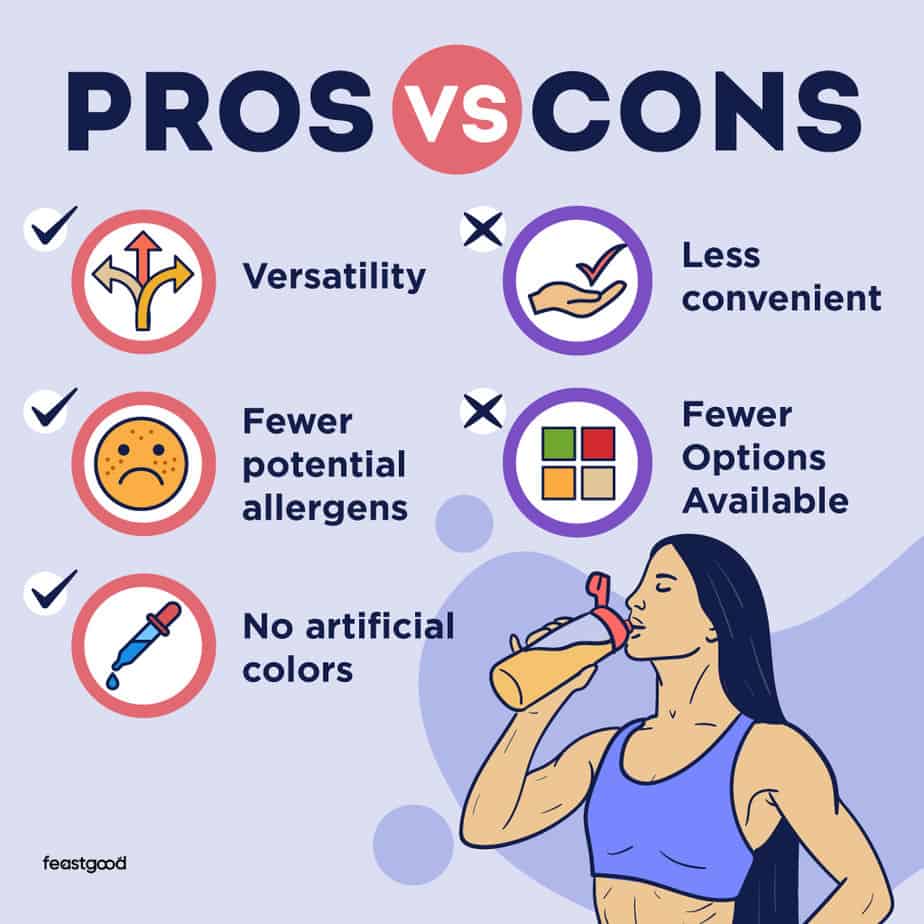
Versatility
Unflavored proteins can be easily integrated into any recipes where extra protein is desired, but you don’t want to affect the taste of the overall product.
Unflavored protein powder is easily added to smoothies, coffee, and milk but can also be added to sauces, soups, stews, and baking.
If you do want to drink it just with water, for instance as a post-workout shake, then you can easily add flavoring like vanilla extract or cocoa and stevia to create a flavored shake.
Fewer Potential Allergens
Some individuals report negative side effects when consuming sweeteners, both from natural sources like stevia and artificial ones like sucralose.
By removing these ingredients, the risk of experiencing negative side effects is reduced.
Furthermore, when you have companies like Naked Whey who have only whey protein, and don’t include emulsifiers like soy, it’s even more likely that these proteins will be suitable for anyone with dairy sensitivities.
No Artificial Colors
To be fair, a lot of supplement companies have been proactive in removing food coloring additives from their products.
There are still incidences however where companies will use artificial coloring to improve the “experience” of using their product. For instance, having something that is strawberry flavored have red dye added.
Food dyes like Yellow 5 and Red 40 have been found to be contaminated with carcinogens and causes of hypersensitivity reactions.
Since these products are unflavored, there is no need for artificial colors to be added.
Cons of Using Unflavored Protein Powder
Less Convenient
If you are wanting a grab-and-go protein option that tastes good mixed with water, then there will always be at least one extra step involved in mixing up this protein powder.
It’s important to remember that “unflavored” does not mean “tasteless”, and when mixed with plain water there will still be a slight, undesirable taste to your protein shake.
Having something on-hand like Mio or Jordan’s Skinny Syrups to mix in will make these taste better, but that means you have to remember to bring your flavoring with you or have to take the time to pre-mix your flavoring in which can affect the convenience of your grab-and-go shake.
Fewer Options Available
Unflavored proteins aren’t offered by every single brand and product.
There are fewer options to choose from when compared to the brands who offer flavored proteins, and It’s possible that your favorite brand doesn’t have an unflavored option.
Our Testing Methodology Explained
Our team of personal trainers and nutrition experts pride themselves on personally trying as many products as possible, and we will never publish an extensive product review without having purchased it and tried it for ourselves.
You can read our in-depth reviews of some of the products mentioned above already at Feastgood.com:
There are some products listed here that we have not personally tried, but they come from companies that we have tried and extensively reviewed, and therefore trust the quality and purity of their products.
In these cases, as well as for products that we haven’t had the opportunity to fully review, we’ve drawn from our personal experiences with the brands, but also from customer reviews online.
We spend time dissecting reviews on the company websites, amazon, and seeing what people have to say on common Q&A and forum websites like reddit and quora.
This allows us to combine what we know to be true about the quality of the brand, and pair that with user experience for things like mixability and satiety.
I am also in the unique position of having been a supplement store manager for the past 10 years.
Products like Quest Multi Purpose Protein Powder, Vega Protein + Greens, and Progressive VegEssential All-In-One are products that have been sold in my store for years and have been customer favorites.
While I have not extensively reviewed them for FeastGood, I have tried all three of these products personally (with VegEssential being part of my weekly regime) which gives me the confidence to be able to recommend them to you.
Frequently Asked Questions
Is Unflavored Protein Powder Healthier?
Technically speaking, all sweeteners and flavors used in other formulas have been approved by the FDA and are therefore deemed safe for consumption. If you are choosing to reduce these processed ingredients from your diet, then unflavored protein powder might be preferred.
What Are The Best Ways To Add Your Own Flavor To Unflavored Protein Powder?
Many companies offer flavor infusers, like Jordan’s Skinny Syrups, but this re-introduces artificial and processed ingredients back into your product. Blending it with fruit, or adding ingredients such as powdered peanut butter, cocoa powder, and extracts like vanilla or almond are great natural alternatives.
Is Unflavored Protein Powder Cheaper?
Unflavored protein powders typically cost the same as flavored products, and may actually cost more than their artificially flavored alternatives. This can be due to the fact that with fewer fillers and additives, there is more overall protein per container.
Does Unflavored Protein Powder Taste Gross?
Unflavored does not mean tasteless, and when mixed with just water unflavored protein powders won’t taste good. They are easy to add into most products like smoothies, sauces, soups, and baking without affecting the taste of those foods. I recommend adding juice, powdered peanut butter, or baking extracts for flavor.
Reference
Sarah Kobylewski & Michael F. Jacobson (2012) Toxicology of food dyes, International Journal of Occupational and Environmental Health, 18:3, 220-246, DOI: 10.1179/1077352512Z.00000000034
About The Author

Jennifer Vibert is a Certified Strength and Conditioning Specialist, Nutrition Coach, and supplement store manager. She has a Bachelor of Kinesiology with a major in Fitness and Lifestyle and a minor in Psychology from the University of Regina. She is a Certified Nutrition Coach through Precision Nutrition, with a passion for helping clients learn the fundamentals of nutrition and supplementation in order to build healthy, sustainable habits.
Why Trust Our Content

On Staff at FeastGood.com, we have Registered Dietitians, coaches with PhDs in Human Nutrition, and internationally ranked athletes who contribute to our editorial process. This includes research, writing, editing, fact-checking, and product testing/reviews. At a bare minimum, all authors must be certified nutrition coaches by either the National Academy of Sports Medicine, International Sport Sciences Association, or Precision Nutrition. Learn more about our team here.
Have a Question?
If you have any questions or feedback about what you’ve read, you can reach out to us at [email protected]. We respond to every email within 1 business day.
